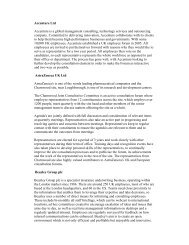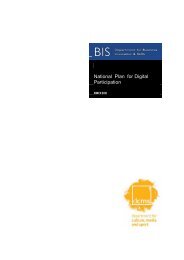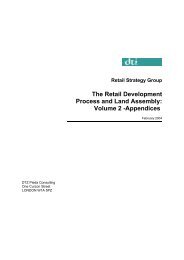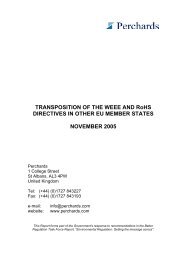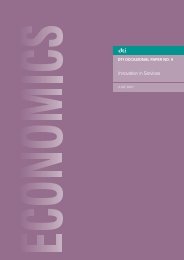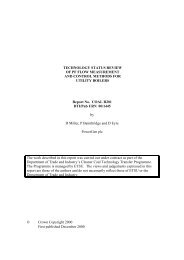Public Policy: Using Market-Based Approaches - Department for ...
Public Policy: Using Market-Based Approaches - Department for ...
Public Policy: Using Market-Based Approaches - Department for ...
Create successful ePaper yourself
Turn your PDF publications into a flip-book with our unique Google optimized e-Paper software.
<strong>Public</strong> <strong>Policy</strong>: <strong>Using</strong> <strong>Market</strong>-<strong>Based</strong> <strong>Approaches</strong><br />
SEGREGATION<br />
Segregation may increase either as a direct result of the exercise of choice by<br />
individuals of the same ethnic/working/educational background or as an indirect<br />
result of any increase in inequality. This problem is of particular concern to the<br />
fostering stable communities agenda, as housing segregation by ethnic group is<br />
thought to have been a contributing factor to the 2001 Northern town riots. 132<br />
Controlling <strong>for</strong> segregation<br />
The House of Commons ODPM Select Committee report on Social Cohesion<br />
(2004) recommended that CBL policy include the encouragement of greater<br />
integration of communities by offering support to tenants moving into areas<br />
where they might be in a minority. ODPM has also set up a Black and Minority<br />
Ethnic Housing Group to assist with a race impact assessment of CBL policy.<br />
In addition, addressing potential inequality problems through methods outlined<br />
previously is likely to have the indirect effect of limiting increases in segregation.<br />
Per<strong>for</strong>mance in practice<br />
There is no evidence of increased segregation to date from either local<br />
evaluations or ODPM-commissioned national evaluations. The issue of<br />
segregation and community cohesion will continue to be monitored through the<br />
current ODPM research, which is looking into the longer-term effects of CBL.<br />
Applicants’ views are also currently being sought on issues including whether<br />
CBL would lead them to consider moving to areas with a different ethnic profile<br />
to their own and will be published as part of the longer-term evaluation report.<br />
Results will be available in 2006. 133<br />
INFORMATION<br />
Participants in a user choice scheme must be able to make rational decisions in<br />
order <strong>for</strong> the scheme to generate positive outcomes. Rational decision making<br />
requires that the supply-side of the market provide sufficient relevant<br />
in<strong>for</strong>mation in a language and <strong>for</strong>mat all users can understand. It also requires<br />
that users are willing and able to bear the costs of collecting this in<strong>for</strong>mation and<br />
assessing alternatives to arrive at their decision. In<strong>for</strong>mational failures arising on<br />
either side of the market could have significant consequences in a CBL context<br />
as they may prevent local authorities from housing those in the greatest housing<br />
need. Such failures could arise if registered households bid <strong>for</strong> inappropriate<br />
properties or do not bid at all, or if households in housing need do not even<br />
register in the first place.<br />
132 See Perri (2003) ‘Giving users of British public services more choice: what can be learned from recent history?’ ,<br />
Journal of Social <strong>Policy</strong> 32(2), pp.239-270.<br />
133 From the ODPM research specification ‘Applicants’ longer term perspectives on choice based lettings’.<br />
134




